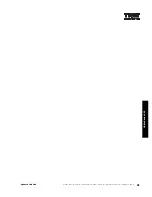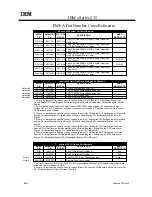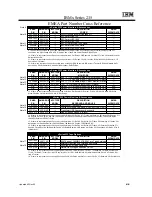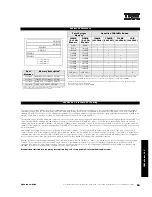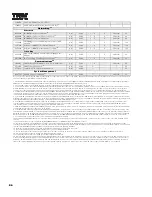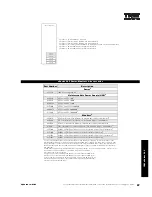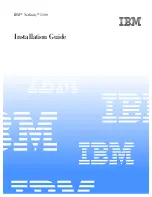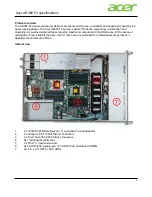
IB
M
xS
eri
e
s
2
5
0
91
For the latest product & technical information, refer to the Information Sources on pages 2 and 3.
Updated 12/03/02
The xSeries 250 contains a hot-swap backplane architected into two backplanes, each containing five drives. This split backplane supports a total of 10 hot-swap
SCA-2 compliant drives. One of the backplanes is connected to one of the internal connectors of the standard Ultra2 SCSI controller through a 16-bit LVDS cable.
Another 16-bit LVDS cable is connected to the other backplane connector; however, this cable is left disconnected at the other end. The standard configuration
allows support of five drives from the standard SCSI controller. If additional drive bays are needed, an optional xSeries Ultra160 SCSI Repeater Card
(P/N 37L7086) must be installed to connect both backplanes into a single channel, 10-bay configuration. The repeater card is shipped with a jumper cable and
installation hardware. Channel A of the dual-channel, Wide Ultra2 SCSI controller only supports external SCSI attachment and is connected directly to an external
0.8mm VHDCI SCSI connector. To support SCSI devices in the internal 5.25in half-high bays, a two-drop terminated, 16-bit LVD SCSI cable shipped with the system
can be used to connect channel B of the integrated Wide Ultra2 SCSI controller to SCSI devices in one or both of the removable media bays when an optional RAID
controller is used to support the internal hot-swap drive bays. If the standard SCSI controller is used to support the hot-swap drive bays, then an optional SCSI
adapter is required to support installation of devices in these 5.25/3.5in half-high bays. Most configurations for this class of server will generally incorporate an
optional ServeRAID-4 Ultra160 SCSI controller to support internal RAID protection. The split backplane of the xSeries 250 is optimized to support a two-channel
ServeRAID controller to enhance performance. Each backplane can be cabled to an internal connector of the RAID controller by removing the standard 16-bit LVDS
cable from the Ultra2 SCSI controller and attaching it to one of the RAID controller connections. The other standard 16-bit LVDS cable is attached to the remaining
internal connector of the RAID controller. In configurations where a single channel RAID array is required, an xSeries Ultra160 SCSI Repeater Card must be installed.
For additional information regarding internal cabling, refer to Appendix F: Internal Cabling Overview.
xSeries 250 Memory
Total
Memory
1
Quantity of RDIMMs Added
2
4 x 128
RDIMMs
standard
128MB
(33L3113)
256MB
(33L3115)
512MB
(33L3147)
1GB
(33L3119)
512MB
-
-
-
-
1GB
4
-
-
-
1.5GB
-
4
-
-
2GB
4
4
-
-
2.5GB
-
8
-
-
3GB
4
-
4
-
4GB
4
4
4
-
5GB
4
-
8
-
6GB
3
-
8
8
-
7GB
3
-
4
12
-
8GB
3
-
-
16
-
9GB
4
-
-
8
10GB
3
-
-
12
4
12GB
3
-
-
8
8
14GB
3
-
-
4
12
16GB
3
(max)
-
-
-
16
This table does not represent all possible memory configurations. Memory modules may vary in price per
MB. Selection of smaller RDIMMs may provide a more cost-effective alternative to using larger RDIMMs.
1. Network operating systems may limit the maximum amount of addressable memory. See operating
system specifications for further information.
2. To obtain the Quantity of memory identified in the “Total Memory” column, select the appropriate row
and order the quantity of RDIMMs identified in all columns for that row. Example: For 2GB, order 4 x
33L3113 plus 4 x 33l3115.
3. Requires removal of standard RDIMMs.
Part
Number
Memory Description
1
33L3113
Netfinity 128MB, 100MHz ECC SDRAM RDIMM
33L3115
Netfinity 256MB, 100MHz ECC SDRAM RDIMM
33L3119
Netfinity 1GB 100MHz ECC SDRAM RDIMM
33L3147
2GB 100MHz ECC SDRAM RDIMM Kit (4 x 512MB)
1. Due to four-way interleaving all RDIMMs installed in each set must be the same size, but all the sets do
not have to contain RDIMMs of the same size. Memory must be installed in sets of four identical RDIMMs
(example: quantity four of 33L3113). Install RDIMM sets in numerical sequence from Set 1 to Set 4.
Chipkill support is provided on the memory card.
xSeries 250 Internal SCSI Cabling
Se
t 1-J1
Set 2-J2
Set 3-J3
Set 4-J4
Set 1-J5
Set 2-J6
Set 3-J7
Set 4-J8
Std RDIMM
All RDIMMs installed in each set must be the same
size, but all the sets do not have to contain RDIMMs
of the same size. Install RDIMM sets in numerical
sequence from one to four.
Std RDIMM
Std RDIMM
Std RDIMM
Set 1-J9
Set 1-J13
Set 2-J14
Set 3-J15
Set 4-J16
Set 4-J12
Set 3-J11
Set 2-J10

